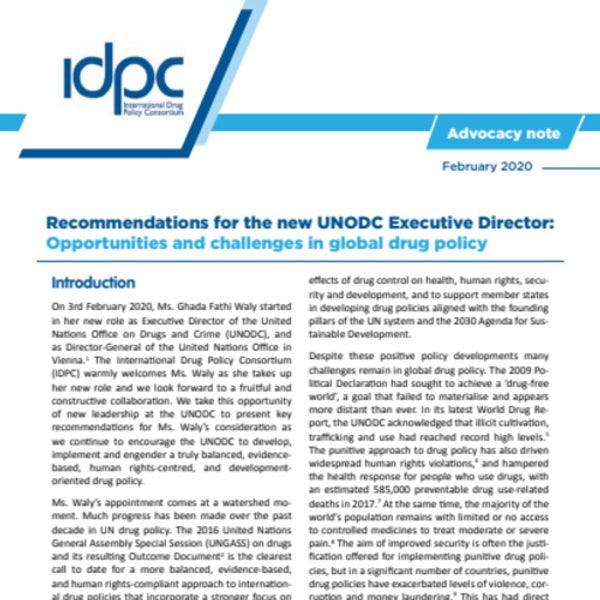Recommendations for the new UNODC Executive Director: Opportunities and challenges in global drug policy
On 3rd February 2020, Ms. Ghada Fathi Waly started in her new role as Executive Director of the United Nations Office on Drugs and Crime (UNODC), and as Director-General of the United Nations Office in Vienna. The International Drug Policy Consortium (IDPC) warmly welcomes Ms. Waly as she takes up her new role and we look forward to a fruitful and constructive collaboration. We take this opportunity of new leadership at the UNODC to present key recommendations for Ms. Waly’s consideration as we continue to encourage the UNODC to develop, implement and engender a truly balanced, evidencebased, human rights-centred, and developmentoriented drug policy.
Ms. Waly’s appointment comes at a watershed moment. Much progress has been made over the past decade in UN drug policy. The 2016 United Nations General Assembly Special Session (UNGASS) on drugs and its resulting Outcome Document is the clearest call to date for a more balanced, evidence-based, and human rights-compliant approach to international drug policies that incorporate a stronger focus on gender and development. The goals and aspirations established within the Outcome Document were reiterated within the 2019 Ministerial Declaration.
In addition, in November 2018 the UN Chief Executives Board for Coordination adopted the ‘UN system common position on international drug control policy through effective inter-agency collaboration’, a much-needed update of the previous UN system guidance that reflected the outcomes of the 1998 UNGASS.The Common Position notably incorporates many of the 2016 UNGASS outcomes. This Common Position allows the UN family to speak with one voice on drug policy issues, to share and integrate the knowledge of all UN entities that deal with the multidimensional effects of drug control on health, human rights, security and development, and to support member states in developing drug policies aligned with the founding pillars of the UN system and the 2030 Agenda for Sustainable Development.
Despite these positive policy developments many challenges remain in global drug policy. The 2009 Political Declaration had sought to achieve a ‘drug-free world’, a goal that failed to materialise and appears more distant than ever. In its latest World Drug Report, the UNODC acknowledged that illicit cultivation, trafficking and use had reached record high levels.5 The punitive approach to drug policy has also driven widespread human rights violations,6 and hampered the health response for people who use drugs, with an estimated 585,000 preventable drug use-related deaths in 2017. At the same time, the majority of the world’s population remains with limited or no access to controlled medicines to treat moderate or severe pain. The aim of improved security is often the justification offered for implementing punitive drug policies, but in a significant number of countries, punitive drug policies have exacerbated levels of violence, corruption and money laundering. This has had direct
consequences on the achievement of the Sustainable Development Goals (SDGs), in particular SDG 1 on poverty, 3 on health, 5 on gender equality, 10 on reduced inequalities, 16 on peace, justice and strong institutions, and 17 on global partnerships. The global drug control debate in Vienna has also become increasingly polarised, in particular on issues such as the use of the death penalty and human rights more generally, new developments in the legal regulation of cannabis, decriminalisation and harm reduction.
In this context, the UNODC has an essential role to play and, working together with relevant UN entities, can show strong leadership by bringing a sense of urgency to the drug policy discussion. We respectfully offer the following recommendations related to the most pressing concerns for Ms. Waly’s consideration, including issues related to facilitating UN system-wide coherence in drug policy, promoting a human rights and health approach, promoting the decriminalisation of people who use drugs, improving access to controlled medicines, promoting a development-oriented approach, expanding the scope of data collection, and ensuring the meaningful participation of civil society in drug policy debates.
Downloads
Topics
Regions
Related Profiles
- United Nations Office on Drugs and Crime (UNODC)
